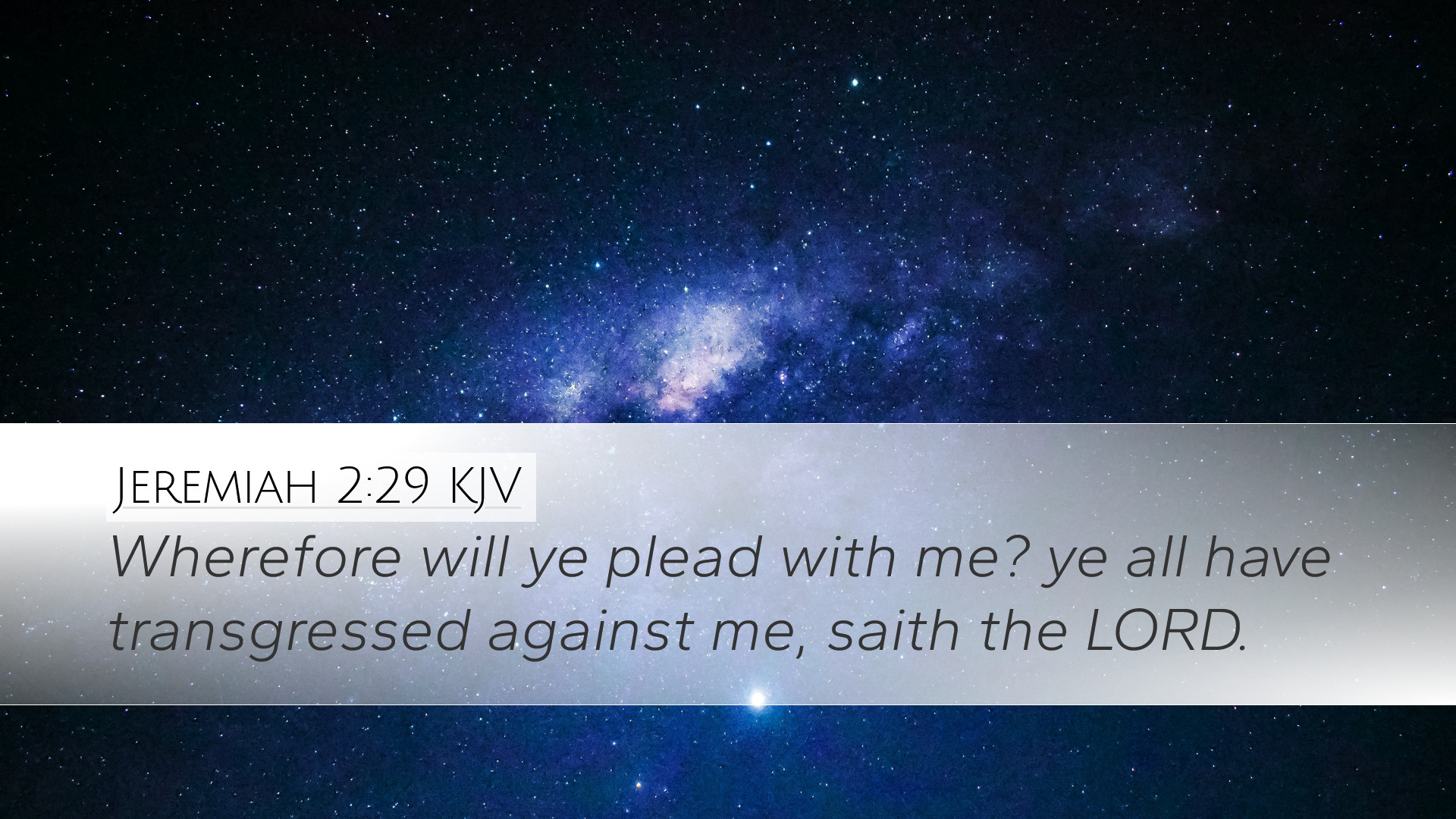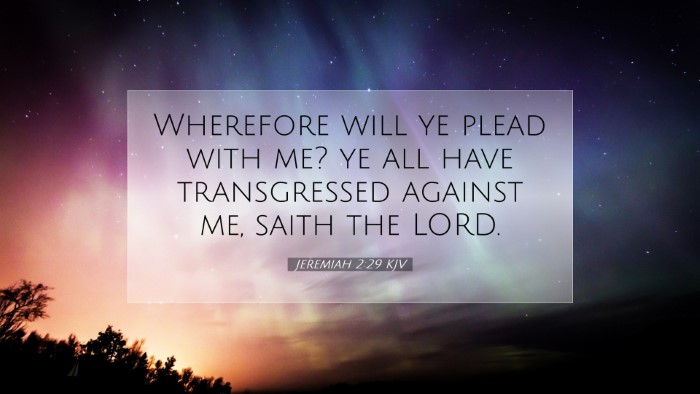Commentary on Jeremiah 2:29
In Jeremiah 2:29, we find the Lord addressing Israel, a people who have turned away from His ways and broken covenant with Him. The verse reads:
"Wherefore will ye plead with me? Ye all have transgressed against me, saith the Lord."
Overview of the Context
This verse is part of a broader message from the prophet Jeremiah, in which he calls out the nation of Judah for their rebelliousness and idolatry. Israel's unfaithfulness is not merely a human failing; it is a grave affront to God's character and His covenant. The intensity of God's pleading reveals His deep affection for His people, which makes their sin even more grievous.
Key Themes in the Commentary
- Divine Pleading: The rhetorical question posed by God signifies His frustration and sorrow. The phrase “Wherefore will ye plead with me?” suggests that God does not desire to engage in arguments over sin but longs for His people to recognize their faults and return to Him.
- Universal Guilt: The declaration "Ye all have transgressed against me" emphasizes that the sin is not confined to a few, but rather it encompasses all of Israel—an important reminder of the collective nature of sin and responsibility among God's people.
- The Call to Accountability: This verse signals a pivotal moment where God holds His people accountable for their transgressions. It serves as a challenge to the contemporary church, prompting leaders and congregants alike to assess their fidelity to God's commands.
Insights from Matthew Henry
Matthew Henry notes that the Lord's question is a form of open dismay. He interprets God's inquiry as a reflection of His justice – how can God plead with a people who have consistently turned away from Him? Henry comments on the futility of defending one's iniquity before a holy God, highlighting that acknowledgment of sin is the first step toward repentance and restoration.
Exegesis by Albert Barnes
Albert Barnes underscores the theological implications of this text. He comments that the verse captures God’s frustration with His people, who instead of seeking reconciliation, often argue or justify their behavior. Barnes points to the tendency of humans to make light of sin, while God's holy nature cannot simply overlook iniquity.
Reflections by Adam Clarke
Adam Clarke places emphasis on the implications of corporate accountability. He challenges believers to recognize their shared responsibility for moral failure within the community of faith. Clarke's insights highlight the seriousness of rebellion against divine commandments, urging an active and communal return to God.
Theological Implications
- Understanding God’s Nature: The verse reflects the relational aspect of God, who desires interaction with His people rather than mere ritual observance.
- Sin and Restoration: The recognition of one's transgressions is essential for true repentance and the restoration of the covenant relationship with God.
- Relevance for Today: This scripture calls today’s church to reflect on its relationship with God and to confront issues of spiritual apathy and idolatry prevalent in contemporary worship practices.
Practical Applications
For pastors, students, theologians, and Bible scholars, Jeremiah 2:29 serves as a multifaceted exhortation:
- For Pastors: This verse encourages shepherds to guide their flocks toward an awareness of sin and the importance of repentance, framing messages that invite accountability and spiritual renewal.
- For Students: Theological students can glean insights into covenant theology and the nature of divine-human relationships, fostering a deeper understanding of biblical narratives that reflect God's steadfast love coupled with justice.
- For Theologians and Scholars: This verse offers rich material for discussions about corporate sin, grace, and the need for communal repentance, serving as a touchstone for contemporary debates on ecclesiology and morality.
Conclusion
Jeremiah 2:29 challenges readers to confront their own hearts and the broader condition of society in relation to God's commandments. Through the insights of Matthew Henry, Albert Barnes, and Adam Clarke, we are reminded that the Lord's heart aches for reconciliation with His people, emphasizing that acknowledging our transgressions is key to restoring relationship and fellowship with our Creator.


